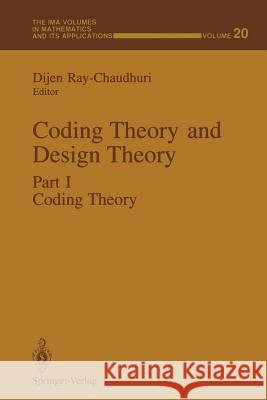Coding Theory and Design Theory: Part I Coding Theory » książka
Coding Theory and Design Theory: Part I Coding Theory
ISBN-13: 9781461389965 / Angielski / Miękka / 2011 / 239 str.
This IMA Volume in Mathematics and its Applications Coding Theory and Design Theory Part I: Coding Theory is based on the proceedings of a workshop which was an integral part of the 1987-88 IMA program on APPLIED COMBINATORICS. We are grateful to the Scientific Committee: Victor Klee (Chairman), Daniel Kleitman, Dijen Ray-Chaudhuri and Dennis Stanton for planning and implementing an exciting and stimulating year long program. We especially thank the Workshop Organizer, Dijen Ray-Chaudhuri, for organizing a workshop which brought together many of the major figures in a variety of research fields in which coding theory and design theory are used. A vner Friedman Willard Miller, Jr. PREFACE Coding Theory and Design Theory are areas of Combinatorics which found rich applications of algebraic structures. Combinatorial designs are generalizations of finite geometries. Probably, the history of Design Theory begins with the 1847 pa per of Reverand T. P. Kirkman "On a problem of Combinatorics," Cambridge and Dublin Math. Journal. The great Statistician R. A. Fisher reinvented the concept of combinatorial 2-design in the twentieth century. Extensive application of alge braic structures for construction of 2-designs (balanced incomplete block designs) can be found in R. C. Bose's 1939 Annals of Eugenics paper, "On the construction of balanced incomplete block designs." Coding Theory and Design Theory are closely interconnected. Hamming codes can be found (in disguise) in R. C. Bose's 1947 Sankhya paper "Mathematical theory of the symmetrical factorial designs.""











